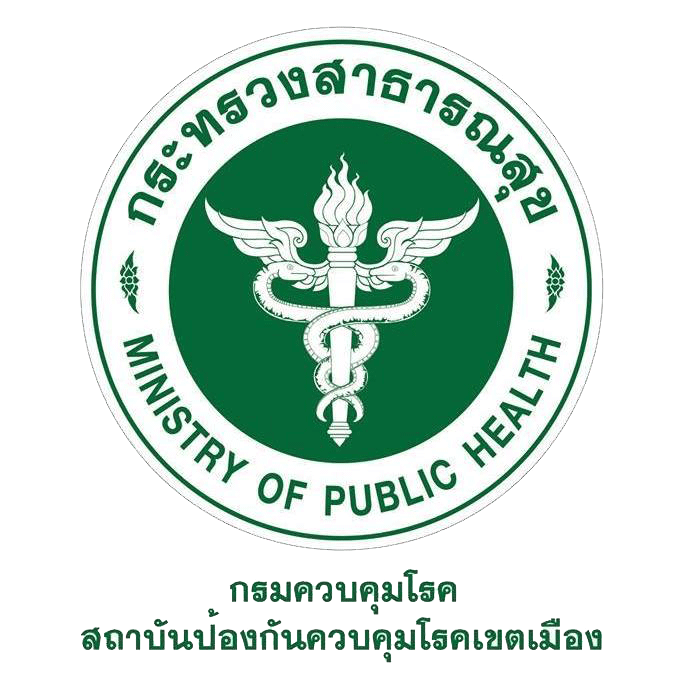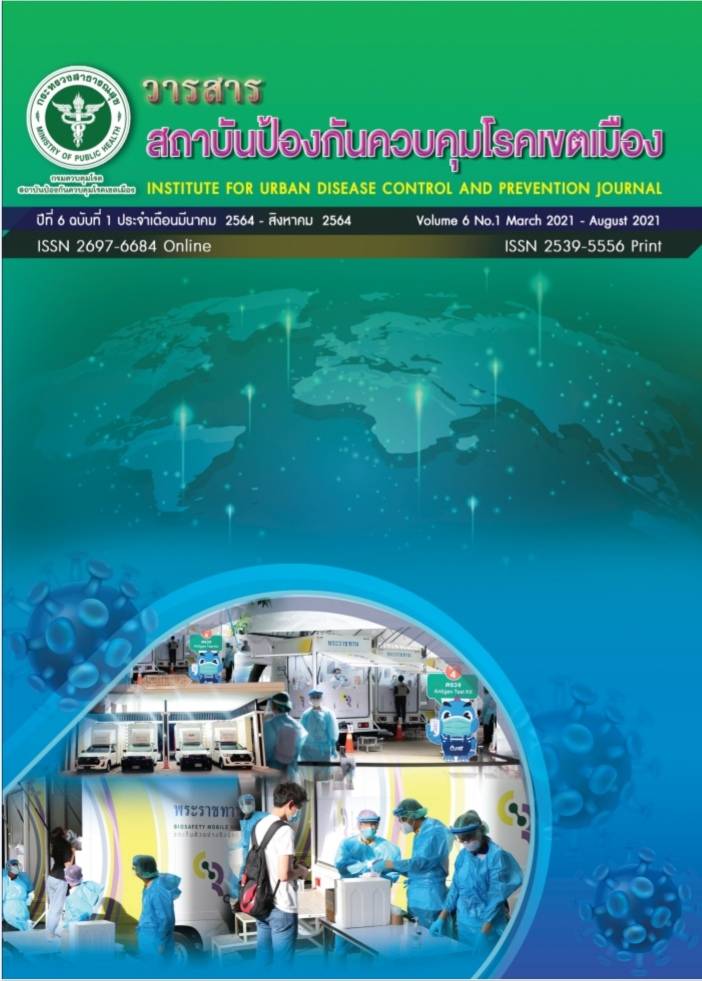พฤติกรรมและความพร้อมในการรับมือโรคติดเชื้อไวรัสโคโรนา 2019 (COVID-19) ของกลุ่มแรงงานต่างด้าวพื้นที่เขตเมือง กรุงเทพมหานคร ประเทศไทย
Main Article Content
บทคัดย่อ
การศึกษาการรับมือโรคติดเชื้อไวรัสโคโรน่า 2019 หรือโรคโควิด 19 ในกลุ่มแรงงานต่างด้าวพื้นที่เขตเมือง กรุงเทพมหานคร เป็นการศึกษาเชิงสำรวจ ในกลุ่มแรงงานต่างด้าว ที่มารับบริการตรวจคัดกรองโรคโควิด 19 จากการค้นหาเชิงรุกในพื้นที่กรุงเทพมหานครชั้นใน ของสถาบันป้องกันควบคุมโรคเขตเมือง ในวันที่ 12 กันยายน 2563 โดยเลือกกลุ่มตัวอย่างแบบเจาะจง ที่สามารถฟัง พูด หรืออ่านภาษาไทยได้ เก็บข้อมูลโดยใช้แบบสอบถามผ่านระบบออนไลน์ ด้วย google form
ผลการศึกษา ผู้ตอบแบบสอบถามทั้งหมด 172 ราย เป็นเพศชายร้อยละ 61.04 ส่วนใหญ่มีสัญชาติพม่า ร้อยละ 52.33 รองลงมา กัมพูชา 37.79 ลาว และเวียดนามน้อยสุด อยู่ในกลุ่มอายุ 26-35 ปี อาชีพรับจ้าง ลักษณะการพักอาศัย ร้อยละ 82.56 อยู่รวมกัน 2 คนขึ้นไป เวลาไม่สบายส่วนใหญ่จะไม่ไปพบแพทย์ 87.25 (ซื้อยากินเอง 48.99 หรือ ไม่ทำอะไร รอหายเอง 38.26) พฤติกรรมส่วนใหญ่สวมหน้ากากอนามัย ร้อยละ 90.70 ล้างมือด้วยสบู่หรือแอลกอฮอล์ ร้อยละ 84.88 มีการเว้นระยะห่างระหว่างกันเป็นบางครั้ง ร้อยละ 63.37 ไม่เคยเว้นระยะห่างเลยถึงร้อยละ 30.23 มีพฤติกรรมการดื่มน้ำแก้วเดียวกันกับคนอื่นหรือรับประทานอาหารจานเดียวกันกับเพื่อน ร้อยละ 21.51ความพร้อมในการรับมือกับโรคโควิด 19 ร้อยละ 82.56 มีหน้ากากอนามัยใช้เพียงพอ ร้อยละ 56.98 มีแอลกอฮอล์สำหรับล้างมือไว้ใช้อย่างเพียงพอ มีการติดตามข่าวสารเกี่ยวกับโรคโควิด 19 ร้อยละ 64.53 และร้อยละ 50 ยังคงมีความกลัวและวิตกกังวลอยู่ในระดับมาก แรงงานกลุ่มนี้มีการปฏิบัติตามมาตรการการสวมหน้ากากอนามัยและการล้างมือและมีความพร้อมในการจัดเตรียมอุปกรณ์ป้องกันไว้เพียงพอ แต่เนื่องจากสภาพความเป็นอยู่ที่อยู่รวมกันทำให้ไม่สามารถเว้นระยะห่างระหว่างบุคคลได้ ทั้งนี้เพื่อป้องกันไม่ให้เกิดการแพร่ระบาดของโรคโควิด 19 ในกลุ่มแรงงาน ควรเน้นให้ความรู้เรื่องการป้องกันตนเอง ไม่ใช้ของส่วนตัวร่วมกับผู้อื่น และการดูแลสุขภาพเวลาไม่สบายควรไปพบแพทย์ อย่ารอให้หายเอง
Article Details
บทความที่พิมพ์ในวารสารสถาบันป้องกันควบคุมโรคเขตเมือง ถือว่าเป็นผลงานวิชาการ งานวิจัยและวิเคราะห์ ตลอดจนเป็นความเห็นส่วนตัวของผู้เขียนเอง ไม่ใช่ความเห็นของสถาบันป้องกันควบคุมโรคเขตเมือง หรือคณะบรรณาธิการแต่ประการใด ผู้เขียนจำต้องรับผิดชอบต่อบทความของตน
เอกสารอ้างอิง
อรุชิตา อุตมะโภคิน. แรงงานข้ามชาติ ประกันสังคม และการตกหล่นในจักรวาลโควิด-19.
[อินเทอร์เน็ต]. 2563 [เข้าถึงเมื่อ 14 ม.ค. 2564]. เข้าถึงได้จาก:https://theactive.net/read/
migrant-workers-social-insurance-an-overlooked-covid19/
ชลนภา อนุกูล, ศยามล เจริญรัตน์, ศิววงศ์ สุขทวี, รัศมี เอกศิริ, ธัญชนก วรากรพัฒนกุล. รายงานวิจัย
ฉบับสมบูรณ์ โครงการการพัฒนานโยบายสุขภาพแรงงานข้ามชาติเพื่อตอบรับวิกฤต
โรคระบาด: กรณีศึกษาไวรัสโควิด-19. กรุงเทพฯ: มูลนิธิเครือข่ายเพื่อสังคมเป็นธรรม (JuSNet).
[อินเทอร์เน็ต]. 2563 [เข้าถึงเมื่อ 14 ม.ค. 2564]. เข้าถึงได้จาก: https://voicelabour.org/
jusnet-เสนอนโยบายสุขภาพแรงงา/
รายงานเสวนา : COVID-19 และแรงงานข้ามชาติ (ในระบบ) ที่หายไป ร้องรัฐหามาตรการ
ช่วยเหลือให้กลับเข้าระบบโดยไว [อินเทอร์เน็ต]. 2563 [เข้าถึงเมื่อ 14 ม.ค. 2564]. เข้าถึง
ได้จาก: https://prachatai.com/journal/2020/12/90875
สุขุม เฉลยทรัพย์. “ความวิตกกังวล” ของคนไทยเกี่ยวกับการแพร่ระบาดโควิด-19.
มหาวิทยาลัยสวนดุสิต[อินเทอร์เน็ต]. 2563 [เข้าถึงเมื่อ 14 ก.ย. 2563 ]. เข้าถึงได้จาก: https://
siamrath.co.th/n/147514


